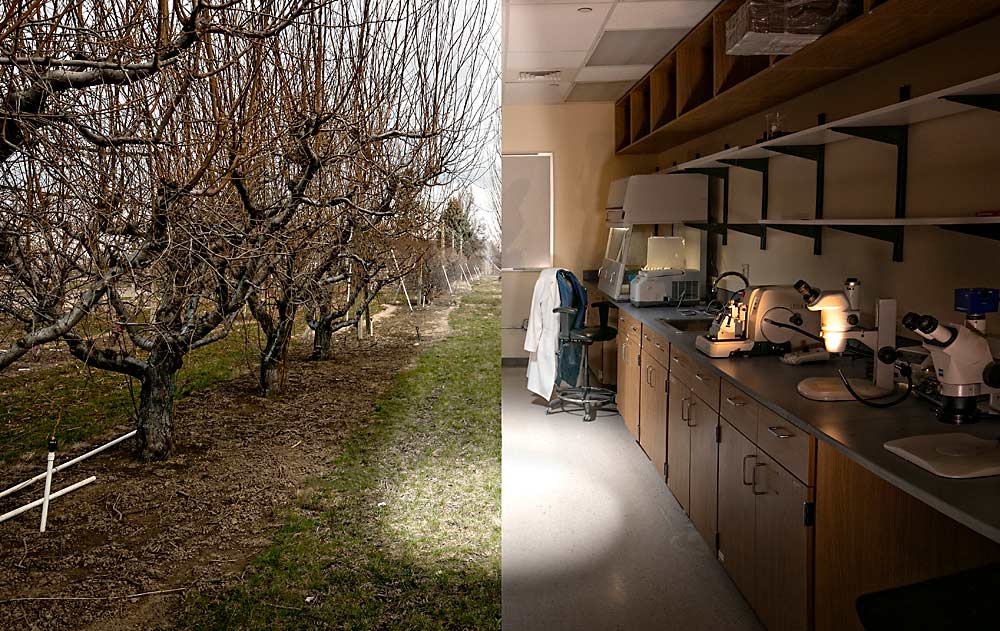
A research orchard and laboratory at the Washington State University, Irrigated Agriculture Research and Extension Center (IAREC) in Prosser, Washington. (TJ Mullinax/Good Fruit Grower photo illustration)
While the shortage of farm workers understandably gets a lot of attention in these pages and across the U.S. agricultural landscape, it’s not the only labor need facing the tree fruit industry. There’s growing competition to fill key expertise roles, too, from Ph.D. researchers with new ideas to replacements for retiring industry leaders with decades of experience.
In this tight-knit industry, retirements can trigger a ripple of job hopping, as people are promoted within companies or plucked from competitors. That’s always been the case, but as fruit production becomes more high-tech, the need to draw in more experts in engineering, food safety and technology has grown, along with ongoing needs for expertise in more traditional fields such as horticulture and entomology.
“It’s an international talent pool now, and we need to make sure we can compete,” said Washington Tree Fruit Research Commission Manager Mike Willett, himself one of the soon-to-be retired.
To help Washington compete in recruiting talent, in 2013 tree fruit growers in Washington state pledged an endowment of more than $32 million to Washington State University to fund the hiring of more research and extension faculty.
But even with that financial support, finding the right researchers has been a challenge for a couple of key reasons: the specialized expertise required can limit the talent pool, and the locations in Wenatchee and Prosser don’t offer the same employment opportunities for spouses, who may also work in the academic world, the way a main-campus position would.
Two endowed chairs have been hired — horticulturist Stefano Musacchi in 2013 and postharvest scientist Carolina Torres started earlier this year — but WSU has run three searches for a soil scientist, without success.
Filling the soil endowed chair position has been particularly challenging, not least because Washington growers want a soil scientist to specialize in the ecological interactions of the soil microbial community and fruit tree root systems, an emerging area of research.
“It’s an infinitesimally small fraction of soil scientists who are working with tree fruit, so we’re asking someone to move and substantially change their research area,” said WSU soil scientist David Brown, who has chaired the searches for the endowed chair. In addition, with the focus on this hot new topic in soil science, “we might have been a little ahead of the curve.”
It’s like looking for a starting quarterback as a free agent, Brown said, turning to football for an analogy. Most of the best quarterbacks already have teams and are not looking to move, and those who are free agents may not be the right fit for the specific needs of this offense.
Every search for an endowed chair is hard, he continued, as these are niche positions requiring elite, experienced researchers. The search is worldwide, and the pool tends to be small.
Recruiting globally increases the challenges as well, as U.S. visa regulations can create problems, sometimes only discovered after an applicant accepts a position. Tree fruit researchers at both WSU and Oregon State University have left in recent years after being unable to secure work visas for their spouses.
Look for more new faces in WSU’s tree fruit extension program in the coming year as well. Extension specialist Karen Lewis said interviews are underway for an Information Technology and Transfer Extension position in horticulture, and searches will launch soon for a similar position in postharvest, a communications specialist, and a tenure-track IPM specialist.
The need to attract the best and the brightest researchers to the industry certainly isn’t new, Lewis said, but the competition might be growing among universities and agricultural sectors as private companies start doing more in-house research. •
—by Kate Prengaman






Leave A Comment